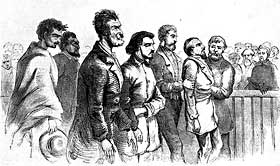The Execution
There were sixteen casualties on both sides of the raid; ten were Brown’s men. Many of the men were captured and killed or mortally wounded during the battle. Though injured, Brown was escorted to jail in Charlestown, Virginia. His trial took place on November 2, 1859. He was convicted of murder, slave insurrection, and treason against the state of Virginia. Judge Andrew Parker sentenced him to death by hanging.
Following Brown’s capture, trial, and sentencing, Mary Ann Brown, his wife, visited him frequently at the city jail. Brown communicated through letters to his wife and children that they should not grieve on his behalf because he will have died fighting for his beliefs.

